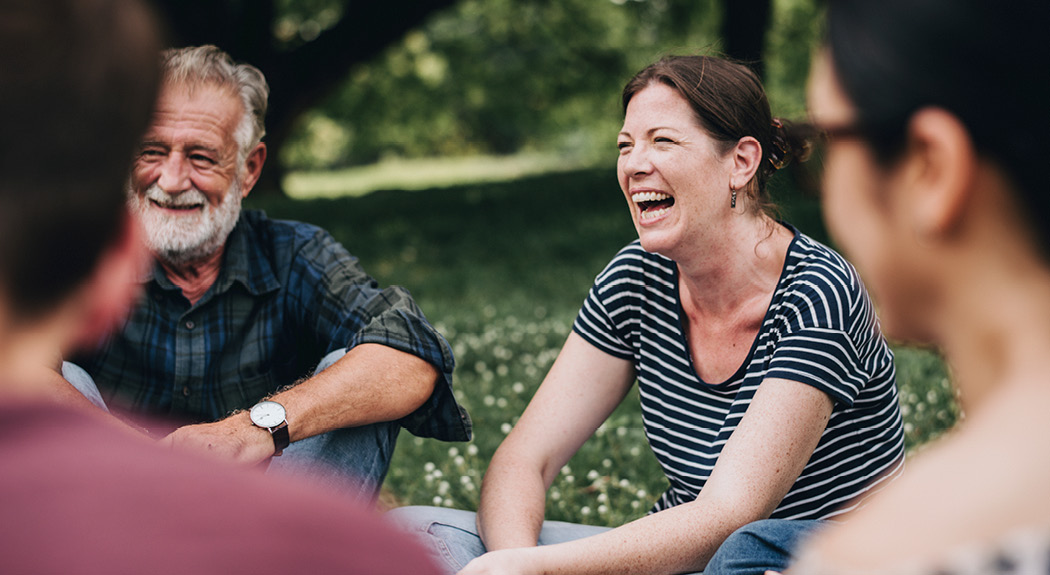We’ve been living in a “state of survival” for some time. Life with COVID-19 has taken a toll on us, physically and mentally. Each phase of this pandemic has brought its own set of worries. Now, vaccines are widely available and society has continued to reopen. We don’t need to be in survival mode anymore. But its effects will linger for some time, possibly years. Coping with a traumatic event like a pandemic is hard on all of us, especially those with mental health conditions. That’s why, as we reenter the world after what we’ve experienced, it’s important to keep our bodies healthy, as well as our minds.
Be empowered with your mental health
Lowering our defenses takes time. The world has changed. So have we. Instead of trying to pick up where we left off before the pandemic, it’s helpful to approach our new normal with caution, positivity and grace.
Here’s how you can strengthen your mental health:
Find peace
Understand that much of the recent challenges were out of your control. You are entitled to your feelings. Accept them. Cut yourself a break.
Fuel your body
Restrictions are loosening, and gyms are reopening. Take advantage. Physical activity is good for your body. It produces hormones (endorphins) that help you feel good. It also strengthens your mind, giving you a sense of accomplishment. Find an activity that gets you moving and motivated. And focus on eating well. The food you consume has a major impact on how you feel. Many of us turn to food for comfort during traumatic events. Now is the time to concentrate on shaping a diet that supports your mental and physical wellness.
Connect with others
Concert venues are again welcoming fans, and capacity limits are being lifted. There’s no substitute to physically being with family, friends and new acquaintances. So grab a coffee, play some tennis, or take a walk. Social experiences can help fill any voids you’ve been feeling.
Go at your pace
You’ve never gone through a global pandemic before. After restrictions, shutdowns and cautious activity, you’re now returning to what was once “irresponsible” or even “dangerous.” Identify your boundaries. Are you comfortable being masked in a movie theater? Are you ready to attend an indoor birthday party? Being truthful with yourself and planning when to draw the line is one way you give yourself control. There is no “right time.” There is only “your time.” And be mindful of others. You may be ready to enjoy an indoor concert, but your friend may not be. Accept that we all move at our own speed and comfort level.
Make a list of things you want to do
Chances are, you can do more now. Trying new things and going new places pushes you out of your comfort zone and confirms that you can overcome the unexpected. Revisiting your favorite restaurants and entertainment venues can also make you feel comforted and refreshed. Most public gathering places have measures in place for you to enjoy their services safely. Respecting these guidelines helps keep you protected.
Limit your news
Many people say they felt most powerless over the pandemic when they watched the news. Limiting how much time you spend reading or watching news reports can help you feel more in control. If you’d like to stay informed, check out the highlights, then move on.
Ask for help
We’ve gotten used to quarantine life, and resuming a more normal life is yet another adjustment to make. Change can be hard, but don’t let fear and anxiety consume you. We continue to process traumatic events after they are over. Reach out to friends and family or seek a trained mental health professional for help. More people are seeking mental health services today than ever. Whether you feel deeply affected by mental illness or you simply need someone to hear your concerns, licensed mental health specialists are committed to helping you process traumatic events and inspiring you to a more peaceful mental state.
 Eshe Montague is the director of our behavioral health program at Luminis Health Doctors Community Medical Center. To learn more about the services coming to Prince George’s County this summer, visit Luminis.Health/BehavioralHealth.
Eshe Montague is the director of our behavioral health program at Luminis Health Doctors Community Medical Center. To learn more about the services coming to Prince George’s County this summer, visit Luminis.Health/BehavioralHealth.



